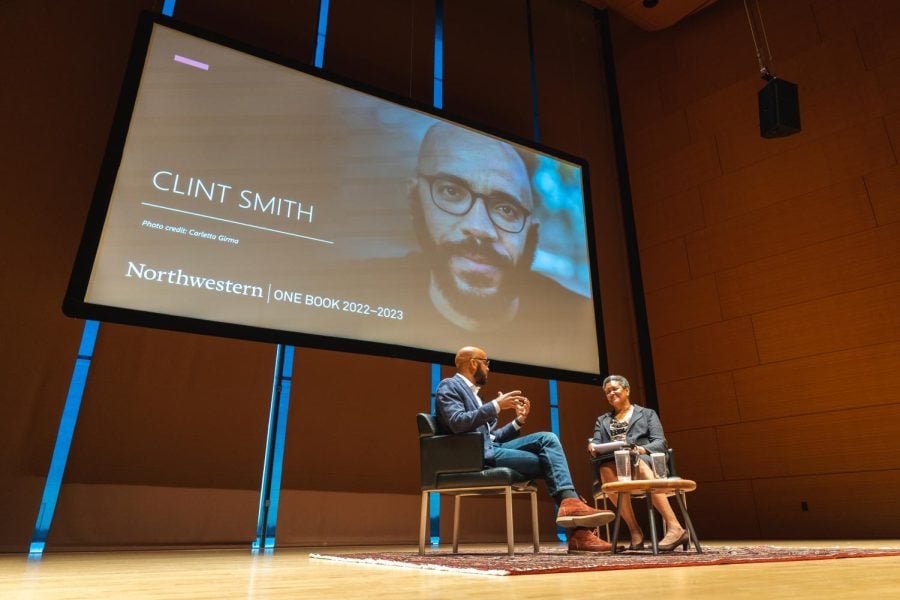Clint Smith discusses racial reckoning, slavery at One Book One Northwestern keynote
Jonah Elkowitz/The Daily Northwestern
Smith discussed how his book reveals the truth of America’s racial past and how he hopes more literature will do the same.
October 18, 2022
As a young boy growing up in New Orleans, Clint Smith felt socially, intellectually and emotionally paralyzed.
“(I was) inundated with messages about all the things that were wrong with Black people, sometimes explicit and sometimes subtle,” Smith said.
He knew those words felt wrong, but didn’t know how to fight them. Smith said he lacked the scholarly grounding to contextualize and confront the discourse he was hearing.
This experience prompted Smith to write his nonfiction book, “How the Word is Passed: A Reckoning With the History of Slavery Across America,” the 2022-23 One Book One Northwestern annual selection.
History Prof. Leslie Harris, who went to the same high school as Smith, moderated an hourlong conversation Tuesday evening in front of an audience of students, faculty and One Book One Northwestern scholars.
While delivering Smith’s introduction, Harris touched on her experience in 2020 when she listened to him describe the book when it was just a manuscript. She said it’s been incredible to watch the book go from an idea to a #1 New York Times Bestseller.
“What was evident to each of us is how beautifully written the manuscript was, even then, amid a time of intense pandemic confusion and sadness, which would only deepen with the death of George Floyd, part of a long pattern of racial violence in this country,” Harris said.
The book starts in Smith’s hometown and walks the reader through a tour of monuments throughout the country, including the Monticello Plantation, to reveal the lasting impacts of the institution on society today.
During his address, Smith said slavery’s legacy in the North and the South is often hidden in plain sight, whether or not we choose to be honest about our past.
He told the story of visiting a Confederate cemetery and meeting a man whose grandfather would tell him stories about how soldiers buried there didn’t fight a war to protect the institution of slavery, but fought it to protect their families.
“What became clear very quickly was that for so many people, history is not about primary source documents or empirical evidence, it’s a story that they’re told, passed down across generations,” he said. “It’s where loyalty takes precedence over truth.”
This interaction shaped the idea for his book, as he wanted to understand how someone could believe something inherently false.
Smith said millions in America hold on to stories they probably don’t agree with but don’t want to relinquish out of loyalty to their ancestors.
“That’s why I wrote the book: First and foremost for the younger 15-year-old version of myself sitting in high school American history class, desperately wanting a book that had information that would help explain why the world in front of him looked the way that it did,” he said.
Smith, a former high school English teacher, said he hopes to create educational materials for schools that do just that.
University President Michael Schill, who spoke at the keynote address, said the book offers a critical parallel of how some Americans address their past honestly and how others avoid its difficult truths.
“The New York Times described the book as a ‘reckoning with reckonings,’ and it seems like an insight that remains very vital at this moment in time,” Schill said.
Email: charlotteehrlich2025@u.northwestern.edu
Twitter: @charlottehrlich
Related Stories:
— History Prof. Leslie Harris announced as One Book One Northwestern faculty chair
— ’Just Mercy’ author Bryan Stevenson delivers One Book One Northwestern keynote
— Clint Smith’s ‘How the Word is Passed’ announced as 2022-23 One Book One Northwestern selection


